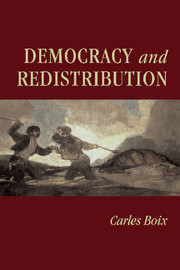Book contents
- Frontmatter
- Contents
- List of Figures
- List of Tables
- Acknowledgments
- INTRODUCTION
- 1 A THEORY OF POLITICAL TRANSITIONS
- 2 EMPIRICAL EVIDENCE
- 3 HISTORICAL EVIDENCE
- 4 THEORETICAL EXTENSIONS: GROWTH, TRADE, POLITICAL INSTITUTIONS
- 5 DEMOCRACY AND THE PUBLIC SECTOR
- 6 THE STATE, THE THREAT OF EXPROPRIATION AND THE POSSIBILITY OF DEVELOPMENT
- 7 CONCLUSIONS
- References
- Index
- Title in the series
2 - EMPIRICAL EVIDENCE
Published online by Cambridge University Press: 05 February 2015
- Frontmatter
- Contents
- List of Figures
- List of Tables
- Acknowledgments
- INTRODUCTION
- 1 A THEORY OF POLITICAL TRANSITIONS
- 2 EMPIRICAL EVIDENCE
- 3 HISTORICAL EVIDENCE
- 4 THEORETICAL EXTENSIONS: GROWTH, TRADE, POLITICAL INSTITUTIONS
- 5 DEMOCRACY AND THE PUBLIC SECTOR
- 6 THE STATE, THE THREAT OF EXPROPRIATION AND THE POSSIBILITY OF DEVELOPMENT
- 7 CONCLUSIONS
- References
- Index
- Title in the series
Summary
Two broad structural conditions, the distribution of income among individuals and the mobility of assets, determine both the type of political regime and the extent of political violence in any country in the long run. At low levels of inequality, the extent of distributional demands from less well-off individuals subsides to make democracy and its tax burden bearable to the richest sectors. Similarly, as asset specificity declines, the threat of expropriation tapers off and democracy becomesacceptable to capital owners. By contrast, in highly unequal countries whose wealth is mainly immobile, class conflict becomes intense: the owners of capital generally resort to an authoritarian strategy to defend their wealth while the poor tend to rebel to level the distribution of assets across society. I now turn to assess the empirical validity of the theoretical model by examining through econometric analysis data spanning 1850 to 1990 on both the type of political regime and the degree of political conflict. Chapter 3 strengthens the results by looking at qualitative evidence extracted from the evolution of Switzerland's cantons and the states of the United States in the last three centuries.
This chapter is organized as follows. In the first section, I discuss the definition and measurement of democracy (and authoritarianism) and describe the distribution of political regimes and political transitions across the world in the last two centuries. In the second and third sections, I employ statistical tools to determine the impact of inequality and asset specificity on the likelihood of a transition to a democratic system from an authoritarian regime (or, conversely, from democracy to dictatorship) using two cross-temporal cross-national panels.
- Type
- Chapter
- Information
- Democracy and Redistribution , pp. 65 - 109Publisher: Cambridge University PressPrint publication year: 2003



